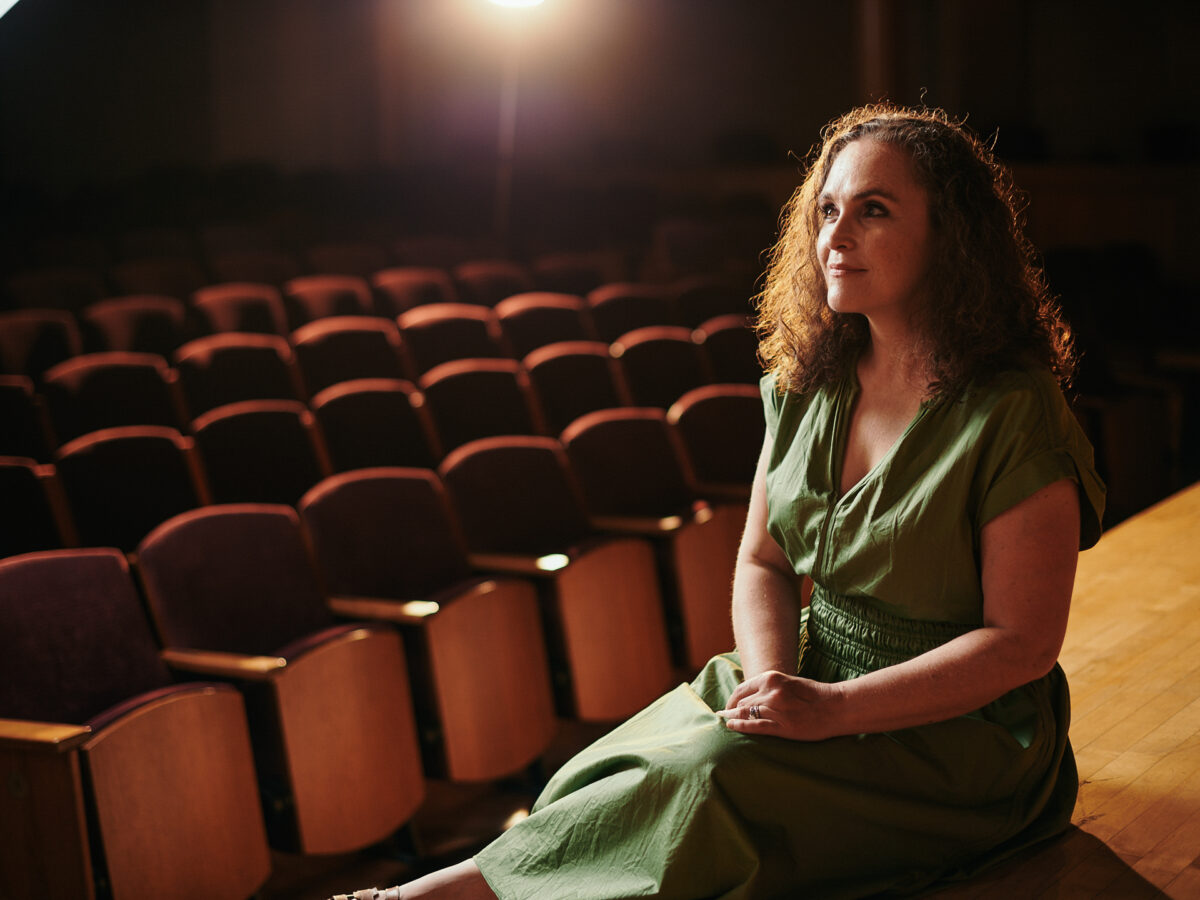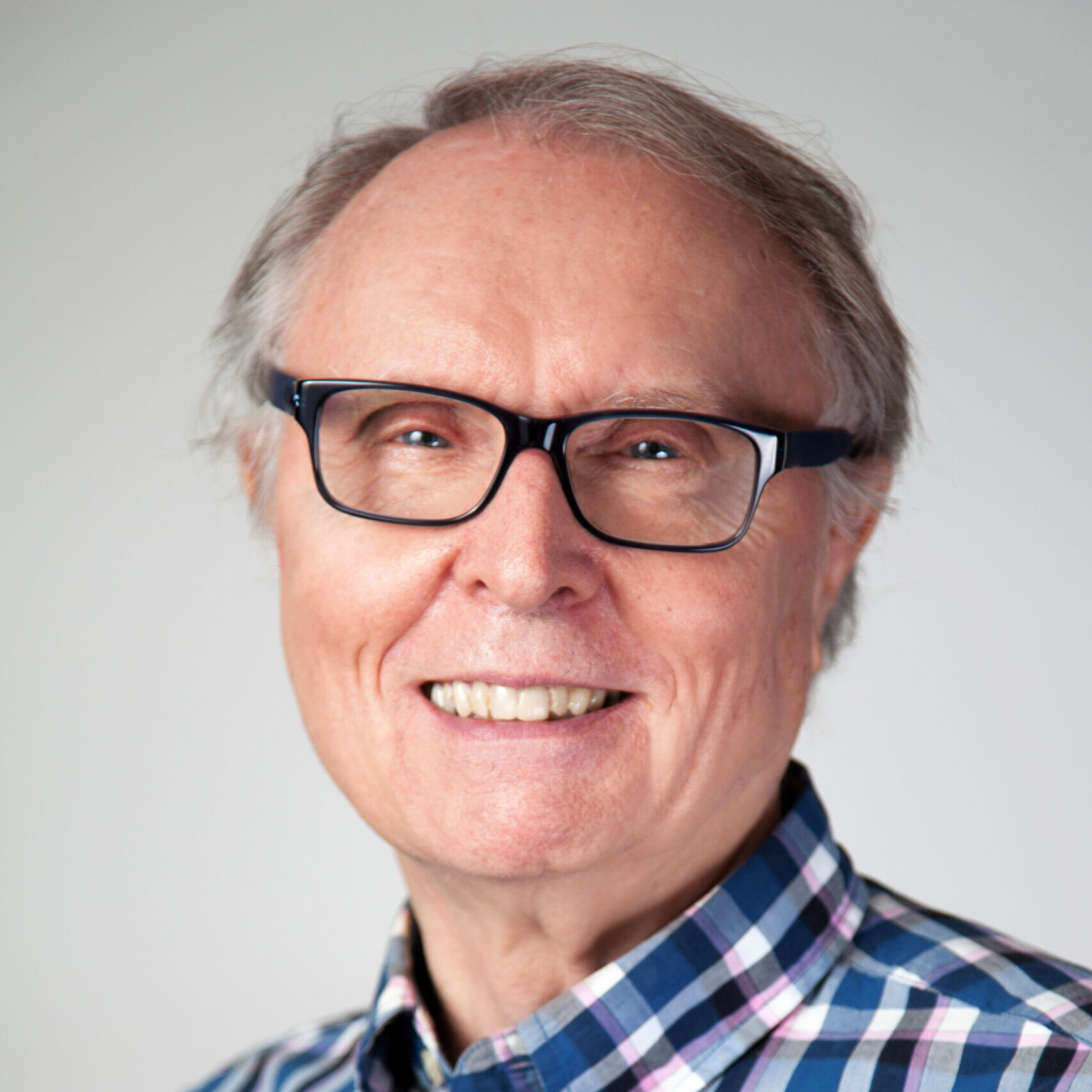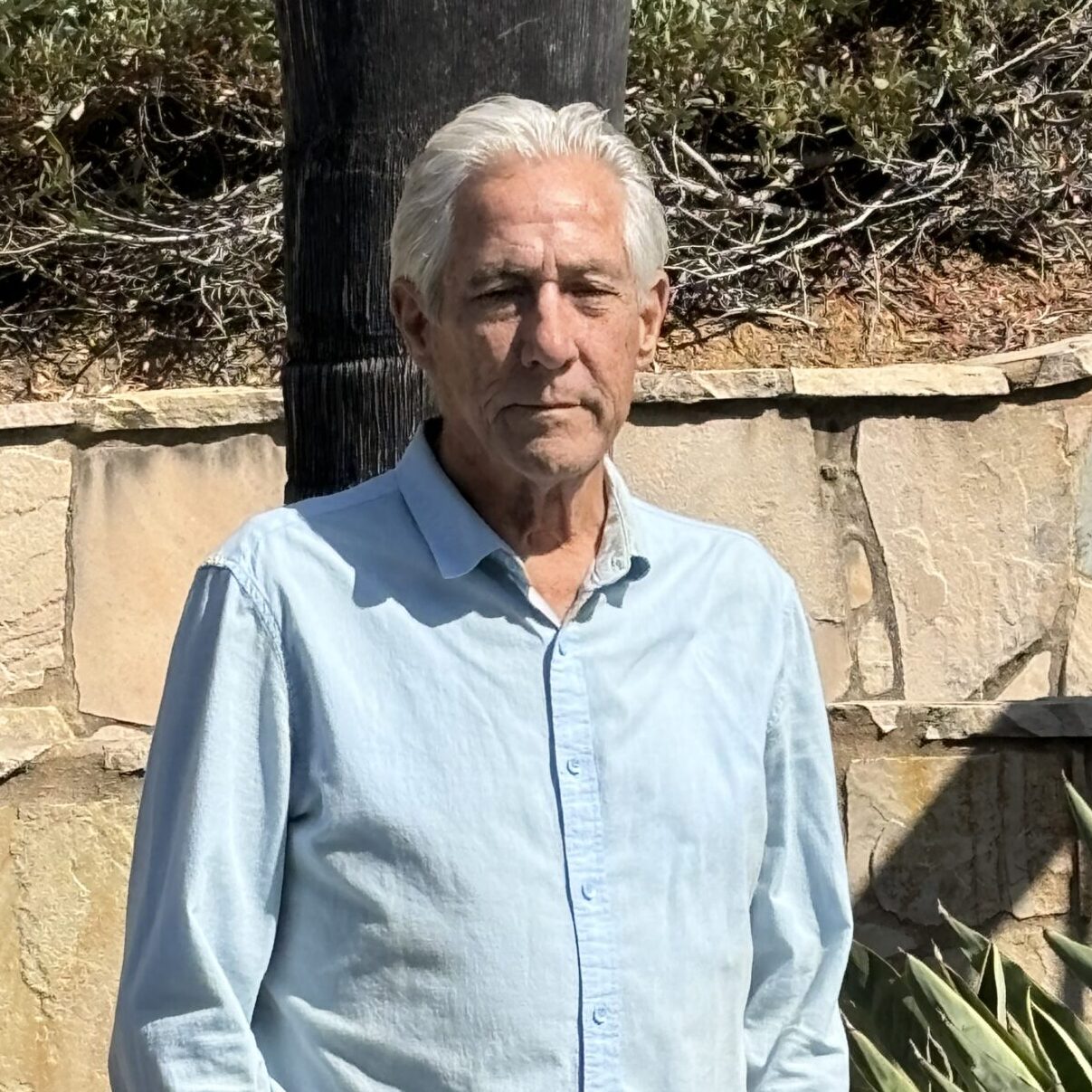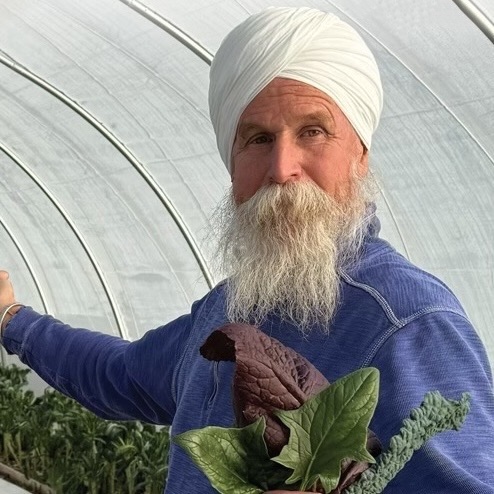Songs of myself

Rebecca Greenawalt '95 finds her voice in a career second act
The concert was happening inside a crypt, underneath a cathedral in the central Italian region of Lazio. The audience was assembled. And Rebecca Greenawalt ’95 was on vocal duty — part of an ensemble choir, gathered in the candlelit stone chamber of Duomo di Acquapendente. As the group performed a Sergei Rachmaninoff piece beneath a towering altar, the resonance of the song and the centuries-old space were electrifying. “It was like the moment in The Wizard of Oz when everything goes from black-and-white to Technicolor,” Greenawalt says.
Just a few weeks earlier, she had been weathering the sale of the dental implant company to which she had given six years of sweat equity. Greenawalt had planned to continue in her role with the company under the new owners. But an invite from a high school friend changed everything.
“Out of the blue, my Exeter choir director, Stephen Kushner, reached out,” Greenawalt recalls, speaking from her home in Denver. “He was putting together a festival choir to sing in Italy.” When Kushner asked Greenawalt if she would join the choir, echoes of an earlier life and a long-dormant passion beckoned. “I really hadn’t done anything with music in such a long time,” Greenawalt says. Building a successful executive-level career in operations while raising a family had created distance from her childhood and early adulthood, when she went from playing the violin to discovering the vocal arts at the Academy. But when Greenawalt learned that Kushner had persuaded one of her best friends from Exeter to join the choir, she said yes.
She didn’t realize it yet, but in taking this sojourn to Italy, Greenawalt had embarked on a new, adventurous chapter of her life and career. She had begun her second act.
What is a second act?
We tend to think of our careers as single-track rides: You discover a calling, you find a job that allows you to pursue it, and you build from there with hard work and determination. Architects, doctors, authors and artists are among the many who dedicate themselves to one discipline and achieve success and fulfillment.
But stories of bold, surprising reinventions, or second acts, abound. Long before serving as U.S. Secretary of the Interior, Deb Haaland was a counselor working with adults with developmental disabilities. Alan Rickman ran a graphic design firm before taking up acting and landing his first film role as Hans Gruber in Die Hard.
Although these pivots can appear to spring out of nowhere, the tracks have often been laid for years, intentionally or subconsciously. Joanne Lipman, a journalist and a lecturer at Yale, spent months speaking with people who have undertaken second acts for her 2023 book, Next! The Power of Reinvention in Life and Work. What she heard surprised her. “I would ask each person to walk me through how they reinvented themselves,” Lipman says. “What they would say is, ‘It’s not a reinvention: It’s a natural, organic expression. A fuller expression of who I am.’”
One of her interview subjects, a former J.P. Morgan economist, swapped spreadsheets for cattle farming. “He had this house in the country; he started learning about farming on weekends, and over time, he got drawn into it,” Lipman says. “He eventually told me, ‘Now that I’m actually a farmer, I’m able to use all my skills as an economist, because I’m essentially running a small business.’”
So perhaps it’s fitting that in the years since 2020 — when the earliest, deadliest months of the COVID-19 pandemic underscored life’s fragility and impermanence — a lot of people have been reevaluating their careers and crafting their second acts. The Bureau of Labor Statistics reported that in 2021, an average of nearly 4 million American workers resigned each month. It is the highest monthly average the bureau has observed since it began tracking the statistic in 2000. Anthony C. Klotz, then a professor of management at Texas A&M University, called it The Great Resignation.
But the wave of resignations was merely the opening scene of a more complex and less appreciated story. “I think people are reinventing themselves in a way that the time and energy they put into their days pays them back at a higher rate, psychologically speaking, than it did in their prior job or whatever they were doing before the pandemic,” Klotz said in a 2022 interview with NPR.
The statistics paint a startling and inspiring picture. A survey conducted by PBS NewsHour, NPR and Marist College suggested that nearly one-third of Americans had switched jobs in 2021 and 2022. From April 2020 to March 2021, the Pew Research Center found, 51% of workers who had changed jobs were earning higher wages than they had over the same months the previous year.
But the Great Reshuffling — a term used by U.S. Census Bureau economist Hubert Janicki — can’t be attributed solely to a desire for bigger paychecks. Because it’s not just midcareer workers who are pursuing second acts. This spring, researchers with T. Rowe Price found that 20% of retirees are staying in the workforce. Of those surveyed, 48% cited financial pressure as their main reason for continuing to work, but another 45% were more interested in the emotional and social benefits of working. For seniors, staying in the workforce may be a path to a second act, or a third act, or more.
“There are many impetuses for second acts,” Lipman says. “For some people, it’s a clear ‘aha!’ moment. Others might have experienced a failure that they’re learning from. Or you could have this gut feeling; a feeling that’s often correct and worth listening to. But in most cases, wherever someone pivots, it’s toward someplace where there’s history; a place they’ve been to before.”
The Road Not (Yet) Taken
 I don’t have memories of life before music,” Greenawalt says with a laugh. Growing up in Exeter, Greenawalt started taking violin lessons at the age of 4. A few performances in theater productions during middle school made her realize that vocal arts brought out something special from within. She followed this curiosity into the Exeter Music Department, learning the art of classical singing with Adjunct Music Instructor Anna Soranno and joining the Exeter Concert Choir. A senior year excursion to the Boston University Tanglewood Institute in the wooded hills of Lenox, Massachusetts, gave Greenawalt a vivid glimpse of how a career in vocals could look and sound. “All of the educational opportunities I had at Exeter seemed to open up many possible paths through the world,” Greenawalt says. “It was such an exciting moment.”
I don’t have memories of life before music,” Greenawalt says with a laugh. Growing up in Exeter, Greenawalt started taking violin lessons at the age of 4. A few performances in theater productions during middle school made her realize that vocal arts brought out something special from within. She followed this curiosity into the Exeter Music Department, learning the art of classical singing with Adjunct Music Instructor Anna Soranno and joining the Exeter Concert Choir. A senior year excursion to the Boston University Tanglewood Institute in the wooded hills of Lenox, Massachusetts, gave Greenawalt a vivid glimpse of how a career in vocals could look and sound. “All of the educational opportunities I had at Exeter seemed to open up many possible paths through the world,” Greenawalt says. “It was such an exciting moment.”
When she arrived at Harvard University in 1995, she joined the a cappella group The Harvard Opportunes, and the Harvard-Radcliffe Collegium Musicum. At the same time, she set her sights on earning a bachelor’s degree in economics and soon discovered an aptitude for financial analysis and problem solving. Greenawalt quickly found herself at a juncture that will be familiar to any undergraduate with an artistic inclination. “I kept thinking: Do I seriously pursue classical music by going to a conservatory or someplace? Or should I follow the more traditional college pathway and pursue a wider variety of interests?” Greenawalt remembers.
After much deliberation, she chose the wider path, finished her degree and landed a job with McKinsey & Company. Working with an array of companies with complex problems that required strategic solutions sharpened Greenawalt’s focus to the operational side of business. That road led her to an M.B.A. program and, later, to ClearChoice Dental. The company boomed during Greenawalt’s tenure as the executive vice president of operations and chief strategy officer. “You’d have patients telling you about being able to kiss their spouse for the first time in 20 years or being able to walk their child down the aisle, smiling,” Greenawalt says. When ClearChoice was sold in 2018, it felt like a well-earned victory. For Greenawalt, it was an affirmation of the choice she made at Harvard.
So when Kushner was looking to put the band back together for a show in Italy, Greenawalt was caught off guard but also thrilled. “People who pursue a life in the arts often feel called to it in an extremely singular way, and that’s not me,” Greenawalt says. “I feel called to many things, and that can be tough sometimes. And it was a joy to see this ship that I thought had sailed coming back around in the bend into the harbor.” The Rachmaninoff concert in the crypt rekindled a curiosity that Greenawalt hadn’t been able to explore since college.
“It was a profound experience that made me rethink what I assumed would be my next steps,” Greenawalt says. After returning from Italy, she stepped down from her position at ClearChoice, repacked her bags and spent the summer exploring Asia with her family, before the arrival of COVID-19. Greenawalt kept a foot in the business world by joining the board of directors for a medical spa company, and she also started taking singing lessons for the first time in 20 years.
In her book on reinvention, Lipman identifies four S’s of a career metamorphosis: the Search, the Struggle, the Stop and the Solution. Greenawalt’s Search took root in Italy, and it reached her consciousness when she started seeking a vocal arts instructor. She was introduced to Andrew Lunsford, then a student at the University of Denver, who had discovered a passion for song in his 20s, after running a granite countertop business. Until then, Greenawalt’s reacquaintance with music had been free of pressure to fashion something out of it. That changed when Greenawalt confided to Lunsford that she wasn’t sure what she wanted the next few years of her life to look like. “Andy listened and then he asked me, ‘Have you ever thought about grad school?’” Greenawalt recalls. “I told him, ‘I’ve already been to grad school,’ and he goes, ‘No, no. For this.’” She was incredulous. “I’m in my 40s,” Greenawalt says. “I haven’t done this in 20 years. It’s an absurd thing — right?”
Changing Course
What Lunsford had in mind for Greenawalt was a graduate performance certificate program. “You submit a video of yourself singing arias and other songs that meet the school requirements, and if you make the cut, you’re invited to audition,” Greenawalt says. She would be starting from scratch, building a repertoire of songs — something she hadn’t done since her late teens. Lunsford persisted, suggesting that he and Greenawalt start small by focusing on individual songs, without fully committing to the idea that it would all be a buildup for graduate training. “It took me a while to process the idea of being a middle-aged person reentering this vibrant, young university environment,” Greenawalt says. “I mean, when you’ve spent 20 years in one career, building skills and doing one thing, it can be hard to conceive of a different life.”
Looking back, Greenawalt identifies her apprehension as stage fright. “A lot of people think that performers don’t have stage fright. Wrong!” she says. “It’s not that we don’t have these elevated feelings; it’s that we learn to channel what someone might experience as negative anxiety into the energy for a good performance.” As Greenawalt and Lunsford developed their songs, the flashes of a different life became more frequent and alluring. So Greenawalt did what many would do when grappling with an idea that feels both opportune and farfetched. She conferred with friends and family, explaining how invigorating it felt to have music back in her life and how the thought of pursuing it professionally, as a graduate student, still didn’t seem realistic for her.
The responses felt like a chorus of their own. “Maybe it was the timing, with life having been upended by the pandemic, because to a person, what I heard was, ‘That’s amazing; why in the world wouldn’t you do that?’” Greenawalt says. But validation was just half of it. “People would also tell me, ‘And you know, I’ve been thinking about doing something too,’” Greenawalt remembers. “It was always a different passion or curiosity. It might be going to culinary school, studying art history, you name it. A lot of us were getting to the place where we weren’t as wrapped up in the day-to-day routine of raising young kids. We’ve had successes, we’ve been knocked around, and we now have the freedom to contemplate and ask, ‘What if I did this?’” Greenawalt’s conversations with Lunsford and her own skepticism constituted what Lipman calls the Struggle — when someone begins to leave a previous identity behind while still figuring out the new one. But the awareness that she wasn’t alone in considering a midcareer pivot yielded one of the most important and elusive pieces of the second act progression: the Stop. “It’s this moment that stops you in your tracks, allowing you to take a beat and get some perspective,” Lipman says. Empowered by the realization that what initially seemed ridiculous might not be absurd after all, Greenawalt found her Solution. She successfully auditioned for the University of Denver’s graduate performance certificate program for voice and opera.
Unlike a more academically inclined master’s track, a performance certificate program is about exactly that: performance. The road she had chosen would lead her onto the stage. She got her groove back, show by show, appearing in university choral concerts and productions of operas such as Handel’s Alcina. By 2023, Greenawalt was weeks away from finishing her program when another unexpected invitation rolled in. Her friend, mentor and advocate Andy Lunsford was going to New York for a performance at Carnegie Hall; a Choirs of America show, in which the winners of high school choral competitions perform on a lineup that also includes big names from the vocal arts world. Lunsford wanted Greenawalt to join him on stage for some songs. The venue was iconic. The audience would be enormous. If she said yes, Greenawalt would have to miss dress rehearsals for an upcoming opera at the university, while testing her mettle in a city long-considered the epicenter of the music industry.
Of course, she was in.
A Musical Life
Carnegie Hall’s Stern Auditorium contains 2,804 seats, spread across five floors with the help of wraparound balconies from which concertgoers have watched headliners such as Tchaikovsky, Judy Garland and Bob Dylan. The epic scale and history of the venue had a humbling — and petrifying — effect on Greenawalt when she arrived in New York to sing with Lunsford. “When you’re up on that stage, you can see everything,” Greenawalt says. “On most stages, you have the lights in your face and you can only see the first few rows of the audience, and everything else fades to gray. But when I walked out onto the stage at Carnegie Hall, in front of all of these faces, it felt like cosplaying.”
Still, she was there, leagues beyond the intimate darkness of the crypt in Tuscany, where the possibility of a musical life flickered back into sight. And there was nothing left to do but start singing. “I’m just like, ‘Well … here I go,’” Greenawalt says, describing what came next as “crazy.” She and Lunsford began with a duet from The Merry Widow, an operetta by Austro-Hungarian composer Franz Lehár. Then it was Greenawalt’s turn in the spotlight, for three solo numbers including “I Dream A Dream” from Les Misérables. After the last song, she came back to earth by watching a subsequent performance by none other than her old Harvard college choir, and she decided to pay a backstage visit to congratulate them on their set.
It was a cheery scene, but the Harvard students really piped up when Greenawalt mentioned that she had sung in the choir before shifting her focus to economics. “They lost it,” Greenawalt says. Imposter syndrome began to flare, as she tried to explain that she was “a middle-aged mom with a business career who unexpectedly and fortuitously got to take a second swing at music.” But as the students kept peppering Greenawalt with questions, it became clear that the duality of her life — her business career and her second act as a vocal artist — was exactly what excited the undergrads. “They were at that age when they want to take over the world; when they’ve got their eyes on all these little stars on the horizon,” Greenawalt says. “As we talked in their dressing room, with me still wearing my sparkly gown from the performance, they’re like, ‘Oh … you can go and be a business executive and then do all of these other things!”
Back in Denver, Greenawalt’s decision to undertake a second act was further vindicated during her graduate program recital — the final test — which earned her not just a performance certificate but an award from the university. Since then, she’s racked up new performances with the Opera Colorado company and has also kept close to the roots of her second act by serving as an advisory board member for Coro Mundi: an international festival choir composed of several members of the ensemble that Stephen Kushner brought to Italy in 2018. (Greenawalt is a founding member of Coro Mundi and has performed with the choir for a number of concerts.)
And yet, perhaps the most surprising twist of Greenawalt’s second act is that in 2024, she decided to fully reopen the door to the business world once again. Not because her new life as a vocal performance artist hadn’t germinated, but because once again, a tempting invitation had arrived unexpectedly.
During her graduate school years, Greenawalt kept a foot in her past life by serving as a board member for medical spa company Ideal Image. When the company was going through a transitional period and needed someone to step in as interim COO, Greenawalt, with her executive background in operations was a logical choice, and she agreed, later serving as interim CEO. “It wasn’t something I sought out,” Greenawalt says. “It was opportunistic, which I think is sort of the theme of my story; being open to opportunities when they arrive.”
It was an intensive reimmersion that forced her to take a six-month hiatus from singing and performing. But there were surprising dividends. “I never anticipated the degree to which all of this time that I spent immersed in vocal music would enhance my effectiveness and my abilities in my primary career,” Greenawalt explains. “Spending three years thinking differently about life and challenges allowed me to come back with a broader, more empathetic ability to understand and support my team.”
The unanswered question for Greenawalt is whether these two worlds can merge for the long term. Within two weeks of finishing her interim role at Ideal Image, Greenawalt was back in rehearsals for an Opera Colorado. “I had actually developed positive vocal changes during my time away from performing,” Greenawalt says. “It’s a work-in-progress, trying to balance it all. But I can say now, very clearly, ‘Here are the things I love about each side of my professional identity; the things I want to pursue.”
More Alumni Second Acts
 Richard Mathisen ’62
Richard Mathisen ’62
First Act: “For 25 years, I was a manager with Prudential. My father had been a pastor, but I had never thought of a pastoral career for myself until 1991. I was going through a divorce. And it felt like God had grabbed me by the scruff of my neck and said, ‘You’re going to seminary!’”
Second Act: “I studied for four years at United Lutheran of Philadelphia and became an interim pastor. And I loved it — jumping in and going at 90 mph with different congregations. I eventually started teaching bible courses for all, including atheists and agnostics, inspired by this vision I first had when I was 19 years old: that someone needed to explain Christianity scientifically.”
Looking Forward: “I’m now enrolled in a three-year doctoral program at United Lutheran, which my wife encouraged me to pursue. I’m 79 years old and feeling happier than ever before in life.
 David Hubbard ’66
David Hubbard ’66
First Act: “I worked as a neurologist, but ever since I was at Exeter, I had been interested in how the brain work sand what consciousness is. I would read about it when I could, as a hobby. But one day, I was in our backyard pool and I had this moment when I saw the dendritic spine neck: these tiny parts of the brain that help us retain memories. I wondered if they were perceptible.”
Second Act: “I was so excited by this idea but I couldn’t prove it yet. First, I wrote a hypothesis paper, then in2020, I wrote the patent for a piece of technology that would make it possible to collect and share our memories; by engaging with the molecule-making in dendritic pines that we need for creating and preserving our memories. Last year, the patent was made official.”
Looking Forward: “I feel like I’ve entered a new world, which is thrilling and intimidating. I liked my first act! Licensing and selling this dendritic spine technology patent to a medical device company is going to be a huge project, over a long period of time. I’ve got to enjoy the process.”
 Sirivishnu Khalsa ’73 (Formerly Keith Pratt)
Sirivishnu Khalsa ’73 (Formerly Keith Pratt)
First Act: “One of my formative experiences at Exeter was being introduced to meditation. This led to studying philosophy and religion in college and joining the American Sikh community. I lived in an ashram in New York City in 1979 and ran a contracting business. I liked the diversity of the city, I liked building things, and I did a lot of restoration work in Brooklyn and Manhattan.”
Second Act: “After my wife and I moved to Santa Fe in 2016, I built a greenhouse on land that was owned by our community, but there were no plans to use it for farming. So I started bringing in folks who knew about organic vegetable farming, to use the land, and I learned how to farm myself. We now have a working year-round farm and we support local food security projects.”
Looking Forward: “I love this business because it’s about growing food and feeding people. I was taught that business is for profit and goodwill, in balance, and while the profitability side of farming is challenging, there sure is a lot of goodwill in it.”
Miles Howard is a writer and author based in Boston. His work has appeared in The Boston Globe, The Washington Post and National Geographic. This article was originally published in the Fall 2024 issue of The Exeter Bulletin.